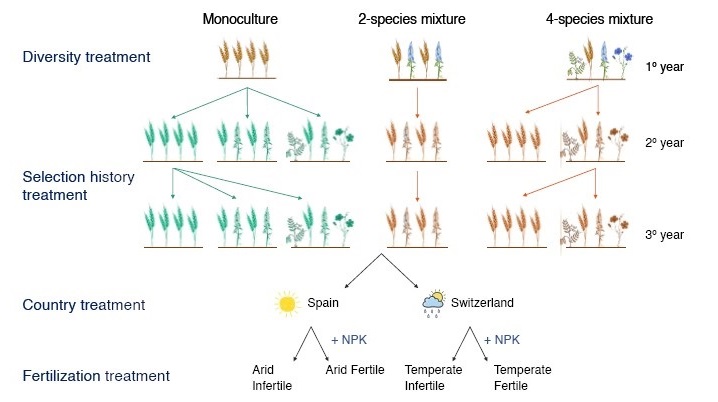Libya Munoz Aguilera
This study, carried out by scientists from the Biodiversity and Conservation area of the URJC and from research centers in Switzerland -among them, the ETH Zurich- has shown that the yield in polycultures (those with greater diversity of species) is more stable compared to the monocultures. This result has been found especially in crops in which fertilizer is applied and that are in more stressful environments such as those of the Mediterranean climate.
Apart from this difference in yield variability, the research team has determined that using seeds from polycultures can increase productivity and decrease crop yield variability. "These results suggest that the interactions between crops that occur in the mixtures act as an evolutionary selective force that promotes niche complementarity, resulting in benefits for the yield of monocultures," explains Jesús López Angulo, honorary collaborator at the URJC. This means that plants of different species interact with each other while in the same crop. For example, they can evolve towards selecting different resources to share space and reduce competition between them.
To reach these conclusions, the team used the Crop Diversity Experiment carried out at the Aprisco de las Corchuelas experimental field station, in Monfragüe. From seven crop species (oats, wheat, lentils, blue lupine, camellia, flax and coriander), monocultures were planted and mixtures between two and four of these species were made to generate polycultures. In addition, a fertilizer treatment was considered to be able to observe, in turn, how the availability of nutrients affected the relationship between the diversity and stability of these crops. This method was replicated in both Spain and Switzerland.
This work, included in the research project "The impact of plant-plant coevolution in crop mixtures on the stability and resilience of an agroecosystem", opens the opportunity for a new line of research in this regard, since "our results suggest that the inclusion of crop diversity in seed improvement and multiplication schemes can lead to higher and more stable yields”, explains the URJC researcher. Studying what factors can lead crops to be more efficient, productive and stable, in addition to knowing the variables that can affect monocultures, is of great importance.

Image: Diagram of the experimental design used in the study.



